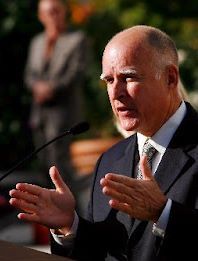Gov. Brown maintains sizable fundraising lead over GOP opponents

 California Governor Jerry Brown begins his re-election campaign with $17 million in the bank.
California Governor Jerry Brown begins his re-election campaign with $17 million in the bank.
The incumbent Democrat governor, according to state disclosure reports released recently, raised $9.9 million last year — with the overwhelming majority of those funds coming from big corporations, labor unions, oil companies and high-worth individuals that routinely lobby state government.
“When you’ve been through the experience like Jerry Brown went through with Meg Whitman, your gut tells you that you better go out and raise as much money as you can because there might be some millionaire or billionaire lurking in the shadows that will try to spend you out of office,” Garry South, one of the state’s leading Democrat campaign consultants, told Bloomberg.
Brown’s Republican opponents will have only a fraction of the governor’s campaign funds. Former Treasury Department official Neel Kashkari, who launched his campaign in January, has yet to file any campaign disclosure reports. Former Lt. Gov. Abel Maldonado, who dropped out of the race in January, raised slightly more than half a million dollars last year.
Assemblyman Tim Donnelly, R-Twin Peaks, reported just $54,299 in cash on hand at the end of the year, after raising $374,212 for his gubernatorial campaign in 2013. However, Donnelly’s fundraising picked up steam after the campaign filing deadline. In mid-January, Donnelly’s campaign received $20,000 from the California Houndsmen for Conservation, which is not factored in the latest cash-on-hand figures.
Neither Cindy Sheehan, the Peace and Freedom’s candidate, nor the Green Party’s Luis Rodriguez filed disclosure reports.
Brown’s fundraising dependent on max-out contributors
Brown’s fundraising in 2013 was largely dependent on max-out contributions from large special interest groups. Under state law, individuals and corporations may contribute up to $27,200 per election. In 2013, Brown’s average campaign contribution was $17,713, with 287 contributions of $10,000 or more. That high average was buoyed by 198 campaign checks of $25,000 or more – with 167 checks written for the legal maximum, $27,200.
Several of those max-out contributions are drawing questions about mixing state business with campaign finances. One max-out contributor, Occidental Petroleum, according to a report by Bloomberg, has an interest in California’s pending review of the state laws governing hydraulic fracturing, more commonly known as fracking.
“Brown took two checks in January for $27,200 each from GEO Group Inc. (GEO), the second-largest U.S. prison operator,” observes Bloomberg. “The donations come after GEO, based in Boca Raton, Florida, last year won a five-year contract worth as much as $150 million to house 1,400 of California’s inmates at two of the company’s jails in the state.”
The governor’s office denies that campaign contributions affect state business. “Contributions have no bearing whatsoever on the state’s legal filings,” said Evan Westrup, Brown’s spokesman.
Campaigning strategy
Brown’s opponents have gotten creative with their limited funds. In contrast to Brown’s high-budget campaign, Donnelly has focused on a grassroots effort, which includes a two-week statewide bus tour. The campaign has more than 40 stops scheduled in its 1,000-mile journey across the Golden State.
“We’re hitting the road to save California!” Donnelly explained on his website. “Over the next two weeks, I’ll be aboard our campaign bus, The Liberty Express, visiting with you and holding events throughout the state.”
In 2010, Brown’s campaign held $12 million
At the same point four years ago, Brown’s campaign reported nearly $12 million in the bank, according to the Associated Press. This year’s campaign chest, thanks to the power and influence of incumbency, is $5 million better, or a 41 percent improvement.
Brown also proved that a penny saved is a penny earned. The report shows Brown spent just shy of $208,000 last year, a relatively low sum for a statewide campaign. The largest expenditure was for two $25,000 bonuses paid to Angie Tate, one of the best Democratic fundraisers in the state, and Edward Ruthrauff, a Brown aide.
Related Articles
CA Confused on "Drought" Meaning
MARCH 7, 2011 BY WAYNE LUSVARDI California’s drought barometer and vocabulary need to be reformed. The bureaucratic apparatus in California
Brown vetoes numerous curbs on drone use; approves one
Despite shooting down a series of bills intended to restrict the private use of drones in public airspace, Gov. Jerry Brown signed
California Democrats release plan to make public college ‘debt free’
California Democrats are making a push to offset the cost of higher education, releasing a sweeping plan to increase student




